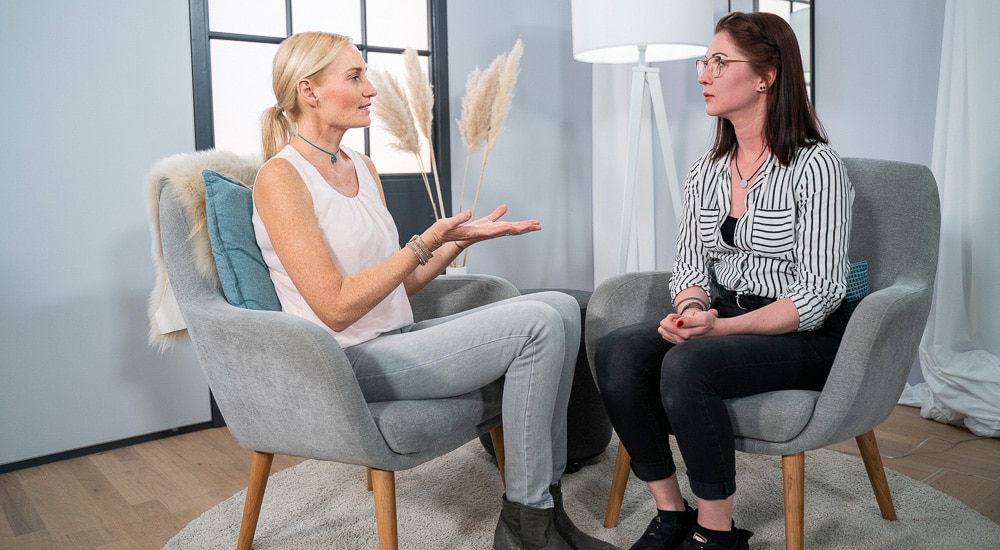
Coaching is becoming more and more popular because it enriches you in different areas of life. They bring you forward personally and help you to recognize and develop your strengths. They also help you to find your calling and to finally really take off in your job. There are countless types of coaching or continuing education coaching - and they all promote your development. They support you on your way to the life you have always wanted.
Many former coachees develop a desire to pass on all that they've learned and help others achieve as well. Do you feel the same way? Then further training in coaching is well worth considering. We'll show you what this kind of training can teach you, what opportunities it offers you, and how you can recognize a good training opportunity.
In a further training course in coaching, you learn what is important if you want to advance your own coachees. You will learn how to successfully convey important content to them and how to anchor it in their mentality in the long term. After all, coaching is only successful if it actually brings about a corresponding change in life. You can work as a coach in a wide variety of areas and will be prepared for exactly this in the Coaching training.
Thanks to the advanced training in coaching, you are optimally equipped for your subsequent work as a coach. But what exactly can you expect? Basically, your job is to advise your coachees on specific topics and give them valuable tips on how they can master their current situation and get the best out of it.
In doing so, you address the individual potential of your coachees and work together with them to develop realistic strategies with which they can improve their accomplish goals can. But that's not the end of it. As a coach, you are also a motivator. You make sure that your coachees don't lose focus on their development path. Hope and throw in the towel. In concrete terms, your work with them consists of five steps for which your further training in coaching optimally prepares you.
Before the actual coaching can begin, you must of course first get to know your coachees better. What problems do they have and where do they want to go? You'll find out by asking specific questions, which will give you a comprehensive picture of the initial situation.
This step often also reveals whether you and your coachees are a good match. It may well happen that you simply do not harmonize on a human level, which would have a negative impact on the subsequent coaching. Don't hang your head if a potential coachee decides against you. This is quite normal and really no reason to be unsettled. They are in no way implying a lack of competence on your part.
Your coachees and you are on the same wavelength and want to continue working together? Great, now it's time to create your consulting plans. Here you record which goals are to be pursued - just as you learned in your coaching training. At this point, you show your coachees what options are open to them and what exactly you will be working on together.
The counseling plans will help you to keep in mind where you want to go. They also make it easier for you to see what progress you've made.
Now the coaching really starts. You now collect specific information about your coachees and analyze where the origin of their problems lies. You also filter out their potential and give feedback again and again. You regularly reflect together on the progress that has already been made.
In this step, do not be tempted to give instructions. You are merely making suggestions, just as you have learned to do in your coaching training. No one likes to be patronized, including your coachees. Never take away the feeling that they have a choice, otherwise they will quickly feel uncomfortable.
The coaching is now in full swing. Don't forget to check again and again whether it really leads to the goal. This gives you the opportunity to adjust the plan again and again and not get off course.
Even in coaching, you can't avoid documenting your sessions. On the one hand, this provides you with security, and on the other, it gives you the perfect basis for tracking progress and regression. If a coachee comes back to you after a coaching session, you can also refer to the documents and pick up where you left off.
The job title "coach" is not protected. This means that basically anyone can call themselves a coach. So why should you do further training in coaching? Well, exactly because of that! When it comes to training, this is where the wheat is separated from the chaff.
Many interested parties take a close look at potential coaches before signing up. Of course, they want to put themselves in the hands of an experienced and, above all, competent coach who can really help them. So take advantage of the opportunity to stand out from the crowd and opt for further training in coaching.
It will help you establish yourself as a reputable resource and build a client base. Thanks to your certificate of completion, you'll always have proof in your hands that you're not just calling yourself a coach on a whim.

As you already know, coaches can be active in a wide variety of fields. That's why there are also various options for further training in coaching. We have compiled a few of them for you and introduce you to the tasks that the coaches take on in each case.
As Life Coach you dedicate yourself to the problems that accompany normal everyday life. Your coachees include people who lead a life with which they are simply not happy. And some of them don't really know how they can change it. Some are trapped in their dull everyday lives and need your support to develop their talents. discover and realize their potential to the fullest. The personal happiness of your coachees is in the foreground here.
In order to finally find this, you give them a new perspective on the situations that burden them and show them how important it is to reflect on themselves again and again. You give your coachees questions that make them think and gradually take away their clouded view of their own lives. Thanks to you, it is easier for them to mobilize their own resources, use their strengths and discard harmful behavior patterns.
Do you decide for a further education in coaching as a Business CoachIn your job coaching, you will deal with the professional life of your coachees. You will support them in identifying their strengths and whether the job they are currently doing is really the right one for them.
Your tasks also include analyzing special skills and unused potential. Often, working people don't make it further up the career ladder because they don't know how much they actually have in them. And this is where your support is needed.
NLP stands for neurolinguistic programming. The coaching, which was created in the 1970s by Richard Bandler and John Grinder, is based on the fact that people often communicate their feelings unconsciously. It is not at all uncommon for words to say something other than what is conveyed by voice pitch, volume or facial expression. As NLP Coach it is your task to recognize the smallest nuances in the communication behavior of your coachees.
This helps you to overcome restrictive Beliefs of your clients. This includes, for example, hopelessness and worthlessness. NLP coaching is based on the assumption that everyone can decide for themselves what they want to believe. So if one of your coachees believes that they are worth nothing, the likelihood that their plans will actually fail increases. Your task as an NLP coach is therefore to carry out a kind of reprogramming in order to free your coachees from such limiting beliefs.
Coaching training can take place either on-site or purely online. However, numerous further education institutes opt for a combination in order to best combine the advantages of both options. Most people who opt for further training in coaching are already in the middle of their professional lives. Therefore, it is often not possible for them to take vacation time whenever a course is scheduled.
For this reason, online training courses are an excellent way to impart basic knowledge. They give you the opportunity to learn whenever you can fit it into your schedule. In addition, if the educational institution you have chosen is not located in your city, there is no need to travel.
As a coach, you will be working closely with people. It is difficult to convey digitally what is important in this very personal interaction. For this purpose, face-to-face events have proven their worth, in which later coaching situations can be simulated very faithfully. A combination of online and face-to-face sessions offers you a high degree of flexibility without sacrificing the active training of interpersonal situations.
The market for coaching training is booming. It's not easy to keep track of which providers are reputable and which are not. To find out who offers good coaching training, you'd almost have to be a coach yourself. We'll show you what to look for when making your choice.
As you already know, basically anyone can call themselves a "coach" since the term is not protected. So look for someone who has actually learned how to do it. These people are often not only the more competent coaches, but also the better teachers.
You may be able to tell if you like the way he/she teaches by looking at video footage available online, or possibly by looking at the instructors' reputations. If this is not the case, you will unfortunately only be able to determine this on site.
What you can check in advance, however, are the key points. How much does coaching training cost and how long does it take to become a trained coach? How long has this training been available and has it already proven itself over the years? How many people have already completed it and what has become of them? These are all questions, thanks to which you can easily compare different coaching providers.

